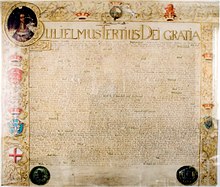Act of Settlement
With the Act of Settlement , the English Parliament created the new basis for the Protestant succession to the throne in the Kingdom of England in 1701 . As a rule of succession to the throne, the Act of Settlement is still valid in the United Kingdom today , but has been fundamentally changed since 2015 by the so-called Perth Agreement .
The full title of the law is An Act for the further Limitation of the Crown and better securing the Rights and Liberties of the Subject (literally, for example: "A law to further restrict the crown and better safeguard the rights and freedoms of the subject ").
Description and history
The Act of Settlement stipulates that after the death of Anne , the last Protestant heir to the throne in the House of Stuart (and later Queen from 1702 to 1714), the right of succession to the throne - bypassing the line of succession that was valid until then - passed to her first cousin Sophie von the Palatinate or their Protestant descendants should pass over. Sophie von der Pfalz was a daughter of Elisabeth Stuart and the closest living Protestant relative of the royal family. It was also regulated that all those of their future descendants who become Catholics or marry a Catholic partner ("profess the papal religion or marry a papist") lose their right to the English (from 1707 British) throne. As a result, all Catholics were excluded from the English or later British line of succession, which after decades of political crises and unrest was the main goal of the law.


The historical background was that the father of Anne, James II. , Who after the English Civil War and the Republican rule of the Puritans under Oliver Cromwell had grown up in exile in France after the restoration of the monarchy in 1660 with his older brother Charles II. To 1668 for Catholic faith was converted. In 1673 he had also married a Catholic Italian princess, Maria Beatrix of Modena . Since his brother had no legitimate children, parliament feared a Catholic succession to the throne and planned in 1679 the exclusion of Jacob from the succession by issuing the Exclusion Bill . However, King Charles II prevented this by dissolving parliament and converted on his deathbed himself in 1685. Jacob succeeded his brother on the throne, as the first Catholic king since the Reformation of the Church of England in 1631. He first had to defend himself against the attempted overthrow of an illegitimate son of his brother. Already in the following year tensions intensified when the papal nuncio and a confessor gained influence, the king appointed Catholics to state offices and university rectorates, and suspended the Anglican Bishop of London and repealed anti-Catholic laws. Worry grew when Queen Mary gave birth to a son and heir, James Francis Edward , in June 1688 , who ousted her husband's Protestant daughters from his first marriage from line of succession. In 1688/89, Jacob II was expelled in the Glorious Revolution and his daughter Maria II was crowned queen, together with her husband, Wilhelm III. of Orange , whose mother was a sister of Charles II and Jacob II.
With the Bill of Rights passed in 1689 , in the middle of the age of absolutism , a power shift in favor of parliament began, which in the long term led to a constitutional monarchy . In 1701, the Act of Settlement was passed, which changed the legitimate succession to the throne by parliamentary resolution and thus made divine right at the disposal of political and denominational majorities and thus made it appear as an empty formula . After the death of childless Wilhelm in 1702, he was succeeded by his sister-in-law Anne, the younger daughter of Jacob II, whose children, however, had all died young and without descendants. With the Act of Union 1707 , England and Scotland were united to form the Kingdom of Great Britain , against considerable opposition in Scotland, above all to secure the succession to the throne according to the Act of Settlement and to prevent Scotland from splitting off under the Jacobites. Indeed, James Francis, the heir to the throne excluded by the Act of Settlement , attempted an invasion of the Firth of Forth in March 1708 .
Anne herself was not enthusiastic about the idea of a successor to her cousin Sophie and refused to invite her and her son to England. The provisions regarding Anne's successor were directly linked to the person of Sophie, but she died three months before Queen Anne. Therefore, after Anne's death in August 1714, the throne passed to Sophie's son Georg I of Hanover , who - after the fleet was mobilized - was asked to move quickly to the island. With his accession to the throne, the reign of the House of Stuart ended , although it had a legitimate heir in James Francis, whose marital birth was denied as a precaution. The rule of the Welfs began as the House of Hanover . Since Georg and his successors kept their German territories, there was also a personal union between Great Britain and Hanover until 1837 . The House of Hanover ruled the British Isles and the Empire until 1901, when the crown passed to the House of Saxe-Coburg and Gotha with the death of Queen Victoria (renamed House Windsor from 1917 ).
The Hanoverian succession to the throne remained controversial and the Jacobite party promoted the return of the Catholic Stuarts to the throne. As early as 1689 there had been uprisings in Scotland and Ireland, in 1708 a planned invasion with French help, in 1715 another uprising in Scotland under the "Old Pretender" James Francis, 1722/23 with the Atterbury coup with French, Spanish and papal coups Support and 1745/46 the invasion of James Francis' son Bonnie Prince Charlie ("The Young Pretender") followed, who first conquered Scotland and then marched on London, but was ultimately repulsed and fled.
The Royal Marriages Act of 1772 later supplemented the provisions of the Act of Settlement : It stipulated that members of the royal family require the consent of the monarch to marry.
The original document of the Act of Settlement (see picture) is today under the signature “Cal. Or. 63, 1 “in the main state archive in Hanover within the Lower Saxony state archive .
Changes: Perth Agreement
Since 2008, initiated by the then Labor government under Gordon Brown , an amendment to the Act of Settlement has been negotiated. On October 27, 2011, the Commonwealth Realms in Perth (Australia) agreed to reform it. According to the statute of Westminster, the change in the line of succession required corresponding legislation in all 16 Commonwealth states in which the British queen or the British king is head of state, unless national legislation simply refers to the regulation of the succession to the throne of the United Kingdom. While all Commonwealth Realms had otherwise ratified the new regulation by the end of 2013, implementation was delayed in Australia, where first all states individually and then the federal state had to adopt the new regulation for the succession to the throne. It was not until March 3, 2015 that the Parliament of Western Australia gave its approval , then the Australian Parliament on March 17, the Senate on March 19, and Royal Consent on March 24 . Two days later, British Deputy Prime Minister Nick Clegg informed Parliament that the new rules on the succession to the throne had come into effect on March 26, 2015.
The following applies to the succession to the throne, regardless of gender, according to the order of birth; this rule applies to all potential heirs to the throne born after October 28, 2011. When it came into force, this regulation first affected the places 28 and 29 of the line of succession, where Senna Lewis (* 2010) moved ahead of her brother Tāne Lewis (* 2012).
Second, marrying a Catholic no longer leads to exclusion from the line of succession, but a ruler himself must belong to the Anglican Church . This regulation applies retrospectively to all living possible heirs to the throne and, when it came into force, first affected the 34th place in the line of succession, which was returned to Georg Windsor, Earl of St. Andrews; his two eldest children, however, were excluded from the line of succession because they belong to the Catholic Church.
Thirdly, only the six next heirs to the throne now need the consent of the current ruler to their marriage, the Royal Marriages Act of 1772 thus repealed. Unlike under the Royal Marriages Act , marriages concluded without consent are no longer void, but merely lead to the exclusion of the person concerned and their descendants from the line of succession.
See also
- Exhibition When the Royals came from Hanover . Hanover's ruler on England's throne 1714–1837 as part of the Lower Saxony State Exhibition 2014
literature
- 300th anniversary of the "Act of Settlement" (= series of publications by the Lower Saxony State Parliament. Issue 44). President of the Lower Saxony State Parliament, Hanover 2001.
- Ronald G. Asch (Ed.): Hanover, Great Britain and Europe. Experience space personal union 1714–1837 (= publications of the Historical Commission for Lower Saxony and Bremen. 277). Wallstein-Verlag, Göttingen 2014, ISBN 978-3-8353-1584-6 .
- Andrew Browning (Ed.): English Historical Documents. Volume 8: 1660-1714 . Eyre & Spottiswoode et al., London 1953, pp. 129-134.
- Anne-Kathrin Härtrich: Georg Ludwig and the question of succession. In: Heide Barmeyer (Ed.): Hanover and the English succession to the throne (= Hanoverian writings on regional and local history. 19). Publishing house for regional history, Gütersloh 2005, ISBN 3-89534-579-2 , pp. 87–111.
- Klaus Mlynek : Successive act (s). In: Klaus Mlynek, Waldemar R. Röhrbein (eds.) U. a .: City Lexicon Hanover . From the beginning to the present. Schlueter, Hannover 2009, ISBN 978-3-89993-662-9 , p. 613.
- Waldemar R. Röhrbein, Alheidis von Rohr : Hanover in the glory and shadow of the British Empire. The effects of the personal union on Hanover from 1714 to 1837. Contributions to the exhibition. Historical Museum am Hohen Ufer, Hanover 1977.
- Georg Schnath : History of Hanover in the age of the ninth cure and the English succession 1674–1714. Volume 4: Georg Ludwig's path to the English throne, the history of the succession to the throne 1698–1714 (= publications of the Historical Commission for Lower Saxony and Bremen. 18). Lax, Hildesheim 1982, ISBN 3-7848-2404-8 , p. 3 ff.
Web links
- Act of Settlement , 1701 (text) .
- Act of Settlement , digitized version of the Lower Saxony State Archives Hanover, signature NLA HA Cal. Or. 63 No. 1.
Individual evidence
- ↑ Wolfgang Koydl: King's Daughters to Power. The Commonwealth of Nations want to change the British rule of succession - in favor of women. In: Süddeutsche Zeitung . October 29, 2011, p. 12.
- ↑ Australia holds up changes to royal succession laws. In: The Guardian . February 27, 2014, accessed August 12, 2014 .
- ↑ Progress of Bills: Succession to the Crown Bill 2014. Parliament of Western Australia, accessed June 12, 2015 .
- ^ Succession to the Crown Bill 2015. Parliament of Australia, accessed June 12, 2015 .
- ^ Commencement of Succession to the Crown Act 2013. UK Parliament, March 26, 2015, accessed June 12, 2015 .
- ↑ a b c Succession to the Crown Act 2013. The National Archives, April 25, 2013, accessed August 12, 2014 .
- ↑ a b What do the new royal succession changes mean? In: Royal Central. March 26, 2015, accessed June 12, 2015 .


